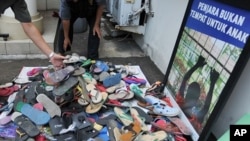The humble flip flop is being used as a satirical symbol of Indonesia's justice system this week, with mountains of the plastic sandals piling up on the doorsteps of police stations across the country. In protest of a juvenile being tried for petty theft, rights groups say the response highlights the public's growing frustration with an institution riddled with corruption.
The flip flops frenzy was sparked by the case of a 15-year-old student from Palu, Sulawesi, who allegedly stole a police officer's plastic sandals worth around $3.
The juvenile defendant, who was also interrogated and beaten by police, now faces up to five years in jail.
The case has sparked nationwide condemnation, with thousands of flips flops appearing on the doorsteps of police stations across the country.
Human Rights Watch coordinator Andreas Harsono says the spontaneous movement shows that Indonesians are growing increasingly contempt with their legal system.
"The fact that people today are dumping dozens of sandals into police stations, in many places, not only in one city, shows that the Indonesian public are fed up with the police," said Harsono. "They are very angry. They see so much violence conducted by the police, injustice. And they see that the police are mostly corrupt."
The Indonesian police force is seen as one of the most corrupt institutions in one of the world's most corrupt countries. But a string of recent, heavy-handed actions is fueling public discontent.
During the Christmas holidays, police shot and killed three people and injured seven others at a protest over a proposed mine in East Nusa Tenggara. Critics say police should not have used live ammunition to control the crowd.
A week earlier, in Sharia-regulated Aceh, police detained 65 punk musicians without charge, forcing them to undergo a "re-education" process that included Islamic prayers and conservative haircuts.
Allegations that police were involved in the beheading of villagers near a palm oil plantation in Southern Sumatra also raised controversy last December.
Harsono says the police rarely investigate their own members for violations and, if they do, the punishments are insignificant. He says such incidents show the police force lacks serious professionalism.
"They are acting more like the military," added Harsono. "Seeing society members as enemies rather than as citizens that they should serve. There should be a lot more serious action toward the police, to reform the police other than only handing out the sandal. There should be concerted efforts to reform the police in Indonesia.
Two police officers have been detained for allegedly beating the 15-year-old who allegedly stole their flip flops.
One is awaiting a disciplinary tribunal while the other has been denied promotion for a one-year period. The boy's trial is expected to continue this week.
Indonesians Use Sandals as Justice Symbol
- By Kate Lamb
